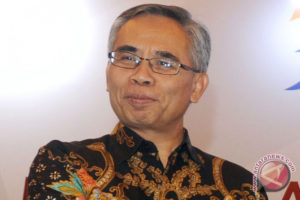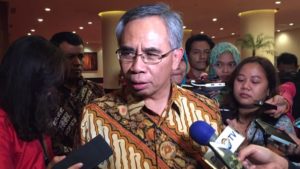OJK..jpg" alt="" width="696" height="441" class="size-full wp-image-105394" /> Wimboh Santoso, Chairman of the Board of Commissioners at the Indonesia Financial Services Authority (OJK).
Jakarta, MINA – The Financial Service Authority (OJK) said the country`s financials service industry is stable and described the performance in bank intermediacy as positive in 2017.
“The stability of the financial service industry in 2017 was thanks mainly to strong capital and adequate liquidity to cope with risks and support business expansion,” Antaa News quoted chairman of OJK board of commissioners Wimboh Santoso as telling reporters here on Thursday.
OJK`s data showed until November, 2017, the capital adequacy ratio (CAR) of Indonesian banks averaged 23.54 percent as against the minimum limit of 8 percent with tier 1 Capital 21.74 percent. Risk based capital of general insurance and life insurance respectively 310 percent and 492 percent, or well above the minimum level of 120 percent.
The market liquidity also is encouraging with excess reserve of banks reaching Rp644.95 trillion by 13 December 2017, the ratio of liquid instrument per non-core deposits and the ratio of liquid instrument per third party fund (DPK) are 101.75 percent and 21.44 percent respectively. Meanwhile, net inflow of fund on the domestic capital market upto 19 December 2017 was Rp129.3 trillion, mainly from the state securities market.
Also Read: Saudi Arabia Wins Bid to Host World Expo 2030
The intermediary performance of the financial service sector also was positive shored up mainly by fund raising at capital market reaching Rp257.02 trillion, exceeding the target of Rp217.02 trillion set for 2017.
Meanwhile, bank intermediacy began to grow as indicated by the amount of bank credits until end of November 2017 at Rp228 trillion bringing the total bank outstanding credits to Rp4,605 trillion – up 7.47 percent year on year.
“OJK estimated that bank credits grow only 7-9 percent in 2017 falling short of the government`s target of 11.86 percent yoy . The shortfall was attributable to the process of consolidation by Indonesian banks in connection with credit risk including non performing loan write off mainly for commodity based credits,”Wimboh said.
It is also encouraging to note that the cost of non performing loan is still within a controllable level at 2.89 percent for banks and 3.08 percent for financing companies. The bank interest rates both on deposits and credits are on the decline.
Also Read: 148 Products from Indonesia Promoted at Sarawat Superstore Jeddah
Data up to November 2017 showed that the interest rate on one-month deposits averaged 5.72 percent , down 64 basis points from last year and the lending rate averaged 11.45 percent , down 72 basis points from last year.
Meanwhile, the composite share price index (IHSG) of the Indonesian Stock Exchange (BEI) tended to gain in 2017 with relatively low volatility . The IHSG this year crossed the psychological level of 6,000 points . Until 20 December, 2017 thye index grew 15.34 percent to a position of 6,109.48 points.
The performance of the sharia financial industry also is improving, so was the performance of sharia stock market industry, which has continued to show be more positive . The assets of sharia banking industry grew 11.09 percent in the first 11 months of this year (year to date/ytd) with financing growing 10.66 percent (ytd). (T/RS5/RS1)
Mi’raj Islamic News Agency (MINA)
Also Read: Packaging Industry Supports Halal Ecosystem


































 Mina Indonesia
Mina Indonesia Mina Arabic
Mina Arabic